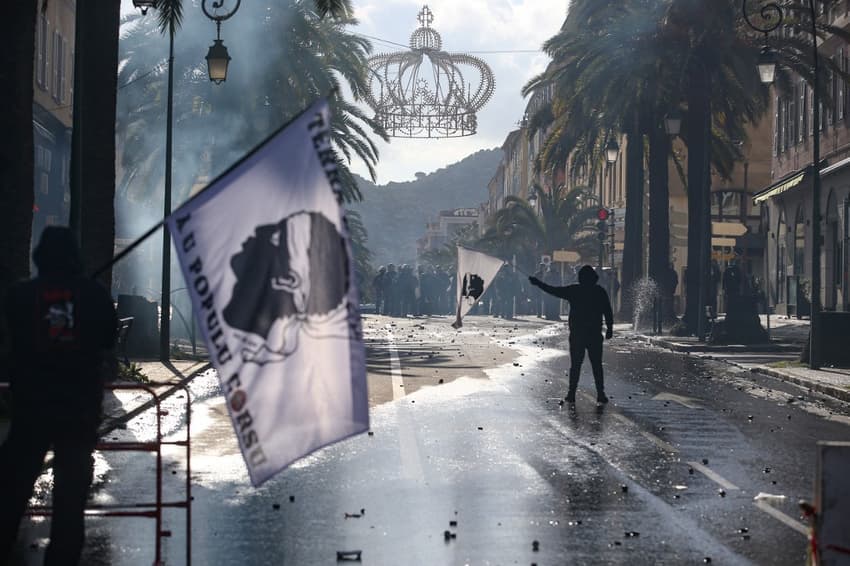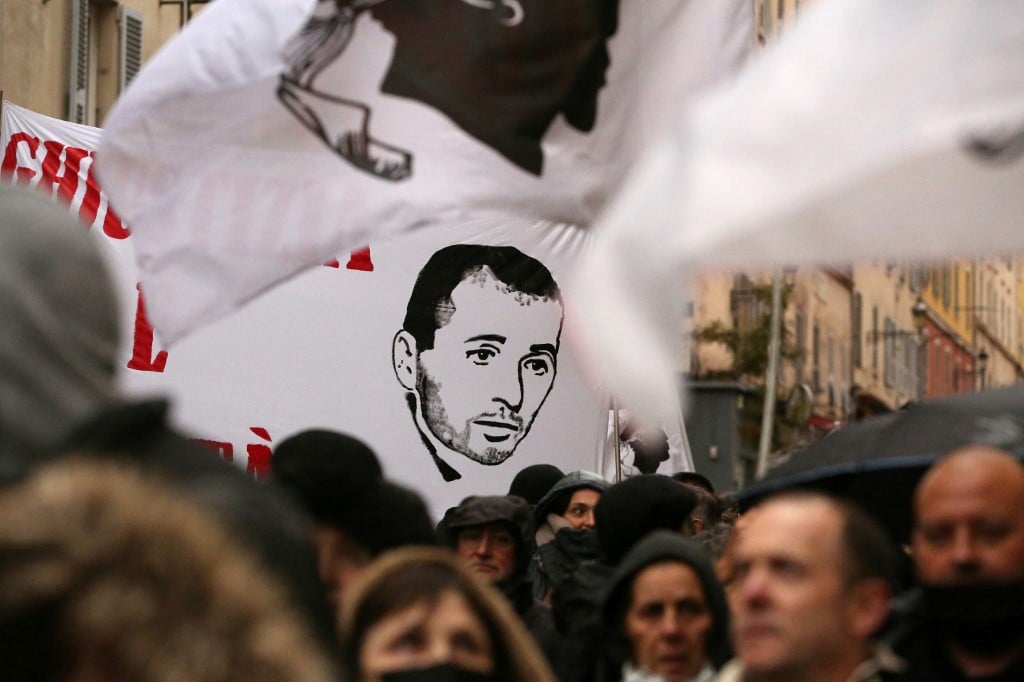EXPLAINED: Why Corsica wants 'autonomy' from France

The French government and elected representatives from Corsica have reached an agreement to give the island special 'autonomous status' - here's the background to a long and sometimes violent struggle.
France's interior minister, Gérald Darmanin, announced on Tuesday that the government had reached an agreement with Corsican representatives for a draft 'constitutional text' that would keep the island 'within the French republic', while recognising autonomous status.
Darmanin told the French press that the agreement "respects both the red lines set by myself and the President Emmanuel Macron, as well as the timeframe discussed."
In September, French President Emmanuel Macron had set a six-month deadline for legislation to be introduced, while adding that there would be two requirements — that Corsica remain part of France and avoiding the creation of “two classes of citizens”.
Corsica shot to the top of the French political agenda in March 2022 when widespread violence broke out over the killing in a mainland prison of Yvan Colonna.
The independence fighter -- jailed for life over the 1998 murder of the region's prefect Claude Erignac -- was stabbed to death by another inmate.
Colonna, who is still seen as a hero by some Corsican nationalists, was left in a coma after being beaten up by another detainee, a convicted jihadist, on March 2nd. He died three weeks later.
His death saw protests, some violent, across the island and eventually led to the offer from Paris of talks on the island's future status.
Corsicans have long wanted more say on their own affairs, as well as official status for their language and protection from outsiders buying up land -- two thorny requests that Paris is reluctant to grant.

Protesters hold a banner depicting Yvan Colonna in Bastia on March 13, 2022. (Photo by Pascal POCHARD-CASABIANCA / AFP)
What is the current status of Corsica?
Constitutionally, the island of Corsica is a French "collectivity with a particular status", formerly known as la collectivité de Corse.
Executive power on issues like foreign policy and defence rests in Paris, but the Corsican Assembly can make policy decisions on things like taxation, energy and education.
The Corsican Assembly is dominated by nationalist, pro-independence nationalist parties.
Three Corsican MPs represent the island of 339,000 people in the Assemblée nationale in Paris.
Compared to other French regional collectivitiés such as Martinique or French Guiana, Corsica enjoys a relative degree of autonomy.
Where does the tension come from?
The unrest gripping Corsica stretches back a long way before Colonna's death.
"It can be heavy to recount," sighed André Fazi, a political scientist from the University of Corsica.
The island was initially ceded to France by the Republic of Genoa in the 18th century.
Napoleon Bonaparte - whose family name was di Buonaparte and who only began learning French in school at the age of 10 - was born on the island and is seen as "a beacon of integration", according to Fazi.
Throughout this period, Corsican soldiers were disproportionately represented in the French armed forces, at times accounting for 20 percent of the colonial army.
Fazi said that the Corsicans became "more French than the French" through to the end of WWII.
Since then, immigration from the French mainland and the former French colony of Algeria stoked an already nascent nationalism on the island.
"There was an explosion of anger in the 1970s and 1980s that we were not used to," said Fazi.
A militant group called the National Liberation Front of Corsica (FLNC) formed in the 1970s and carried out a number of bombings. Yvan Colonna belonged to a group close to the FLNC - he was serving time for killing the island's French Préfet in 1998.
The FLNC officially declared an end to their armed struggle in 2014.
Today, the calls for greater autonomy are generally directed through more democratic means, such as the Corsican Assembly.
What are the options?
Among the Corsican nationalists who dominate the local parliament, there have been divides between those calling for full independence and those who want to remain part of France, but with greater powers given to island authorities.
On the French mainland there is strong opposition to giving Corsica full independence, especially among politicians on the right. While campaigning for president, the ex-centre right candidate Valérie Pécresse slammed the government for "giving into violence" by putting the possibility of greater autonomy on the table, while Marine Le Pen said: "Corsica must remain French".
As a result, the draft text focuses on autonomy - giving the local parliament extra powers while keeping the island part of France.
Comments
See Also
France's interior minister, Gérald Darmanin, announced on Tuesday that the government had reached an agreement with Corsican representatives for a draft 'constitutional text' that would keep the island 'within the French republic', while recognising autonomous status.
Darmanin told the French press that the agreement "respects both the red lines set by myself and the President Emmanuel Macron, as well as the timeframe discussed."
In September, French President Emmanuel Macron had set a six-month deadline for legislation to be introduced, while adding that there would be two requirements — that Corsica remain part of France and avoiding the creation of “two classes of citizens”.
Corsica shot to the top of the French political agenda in March 2022 when widespread violence broke out over the killing in a mainland prison of Yvan Colonna.
The independence fighter -- jailed for life over the 1998 murder of the region's prefect Claude Erignac -- was stabbed to death by another inmate.
Colonna, who is still seen as a hero by some Corsican nationalists, was left in a coma after being beaten up by another detainee, a convicted jihadist, on March 2nd. He died three weeks later.
His death saw protests, some violent, across the island and eventually led to the offer from Paris of talks on the island's future status.
Corsicans have long wanted more say on their own affairs, as well as official status for their language and protection from outsiders buying up land -- two thorny requests that Paris is reluctant to grant.

What is the current status of Corsica?
Constitutionally, the island of Corsica is a French "collectivity with a particular status", formerly known as la collectivité de Corse.
Executive power on issues like foreign policy and defence rests in Paris, but the Corsican Assembly can make policy decisions on things like taxation, energy and education.
The Corsican Assembly is dominated by nationalist, pro-independence nationalist parties.
Three Corsican MPs represent the island of 339,000 people in the Assemblée nationale in Paris.
Compared to other French regional collectivitiés such as Martinique or French Guiana, Corsica enjoys a relative degree of autonomy.
Where does the tension come from?
The unrest gripping Corsica stretches back a long way before Colonna's death.
"It can be heavy to recount," sighed André Fazi, a political scientist from the University of Corsica.
The island was initially ceded to France by the Republic of Genoa in the 18th century.
Napoleon Bonaparte - whose family name was di Buonaparte and who only began learning French in school at the age of 10 - was born on the island and is seen as "a beacon of integration", according to Fazi.
Throughout this period, Corsican soldiers were disproportionately represented in the French armed forces, at times accounting for 20 percent of the colonial army.
Fazi said that the Corsicans became "more French than the French" through to the end of WWII.
Since then, immigration from the French mainland and the former French colony of Algeria stoked an already nascent nationalism on the island.
"There was an explosion of anger in the 1970s and 1980s that we were not used to," said Fazi.
A militant group called the National Liberation Front of Corsica (FLNC) formed in the 1970s and carried out a number of bombings. Yvan Colonna belonged to a group close to the FLNC - he was serving time for killing the island's French Préfet in 1998.
The FLNC officially declared an end to their armed struggle in 2014.
Today, the calls for greater autonomy are generally directed through more democratic means, such as the Corsican Assembly.
What are the options?
Among the Corsican nationalists who dominate the local parliament, there have been divides between those calling for full independence and those who want to remain part of France, but with greater powers given to island authorities.
On the French mainland there is strong opposition to giving Corsica full independence, especially among politicians on the right. While campaigning for president, the ex-centre right candidate Valérie Pécresse slammed the government for "giving into violence" by putting the possibility of greater autonomy on the table, while Marine Le Pen said: "Corsica must remain French".
As a result, the draft text focuses on autonomy - giving the local parliament extra powers while keeping the island part of France.
Join the conversation in our comments section below. Share your own views and experience and if you have a question or suggestion for our journalists then email us at [email protected].
Please keep comments civil, constructive and on topic – and make sure to read our terms of use before getting involved.
Please log in here to leave a comment.